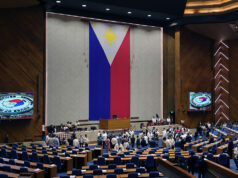Proposed tobacco tax cut unlikely to curb illicit trade — AER

THE ACTION for Economic Reforms (AER) and government officials are opposing bills that seek to cut tobacco excise taxes, arguing that such measures are unlikely to curb illicit trade without stronger enforcement and a nationwide licensing system.
“We’re against the rolling back of tobacco taxes because according to our projections, it will lead to at least two million new smokers by 2035, and at least P167 billion worth of foregone revenues,” AER Advocacy and Communications Officer Sofia P. Rodrigo said at an event on Tuesday.
The estimate is based on House Bill (HB) No. 11360 which was passed by the House of Representatives in January but failed to gain traction in the Senate before the 19th Congress closed.
Despite this, lawmakers have filed HB 5207, HB 5212, and HB 5364 which all aim to lower taxes on vape and heated tobacco products. Industry groups have claimed that high taxes are pushing consumers toward illicit cigarettes.
AER refuted this argument, saying the rise in illicit tobacco trade stems from weak enforcement and governance gaps, not from high tax rates.
This was affirmed in a recent study by the AER and John Hopkins Bloomberg School of Public Health that showed high tobacco taxes is not fueling illicit trade in the Philippines.
The report flagged Southern Mindanao, particularly Zamboanga City and General Santos, as a hotspot for illicit tobacco activity due to weak government enforcement.
“The study emphasizes that tobacco excise tax rates — applied uniformly nationwide —cannot explain regional disparities in illicit trade. Instead, local political will, maritime governance, and enforcement intensity determine where illicit products thrive,” AER said.
The study identified three key illicit tobacco practices: pricing below the legislated floor price, violating tax stamp rules, and smuggling unregistered brands.
Zamboanga City is the main hotspot for illicit tobacco trade, with 79.5% of cigarette packs sold below the combined excise and value-added tax, while 96.3% of cigarette packs had fake or missing tax stamps. Smuggled unregistered brands accounted for 47.5% of all collected packs in Zamboanga.
In contrast, the prevalence of illicit cigarette sales was significantly lower in Luzon, Visayas, and Metro Manila, AER said.
In Navotas, only 0.2% of cigarette packs were sold below the total applicable taxes, while 8.8% carried fake or missing tax stamps and 0.8% were unregistered brands, the study showed.
The research was based on surveys of more than 1,000 sari-sari stores and an audit of over 7,500 cigarette packs in eight key cities such as Dagupan, Navotas, Quezon City, Pasay, Batangas, Mega Cebu, Zamboanga, and General Santos.
At the same event, Senator Risa N. Hontiveros-Baraquel said this study affirmed that stricter implementation of existing regulations and stronger policies, not tax cuts, are crucial in combating illicit tobacco trade.
“In fact, lowering taxes, especially at this point when our economy is struggling and the government needs revenues, may not be a good idea,” she said.
The senator noted that while smoking prevalence continues to rise, the revenues from excise taxes on tobacco products are falling.
The latest data showed excise tax collections on tobacco reached P134.52 billion in 2024, slipping by 0.3% from P134.92 billion in 2023. This was an improvement over the 15.84% year-on-year decline seen in 2023.
BIR Commissioner Romeo D. Lumagui, Jr. said the BIR had collected about P106 billion in excise tax from tobacco in the first nine months of the year from P84 billion a year ago.
In addition, AER also warned that lowering taxes would benefit smugglers, undermine public health, and erode government revenues.
Among the AER’s recommendations include upgrading the current tax stamp system to an up-to-date track-and-trace system, licensing all tobacco retailers, empowering the BIR, and tightening coordination among agencies.
Mr. Lumagui said the BIR is working to address the illicit trade of tobacco products in digital marketplaces. He said the BIR is currently implementing a multi-year digital transformation (DX) program, which is set to be completed by 2030.
“A key element of our DX program is the drive to upgrade our existing track and trace systems in order to significantly enhance our capacity to efficiently monitor and regulate the sale of excisable products, particularly tobacco products,” he said in a video message at the AER event. — Aubrey Rose A. Inosante



